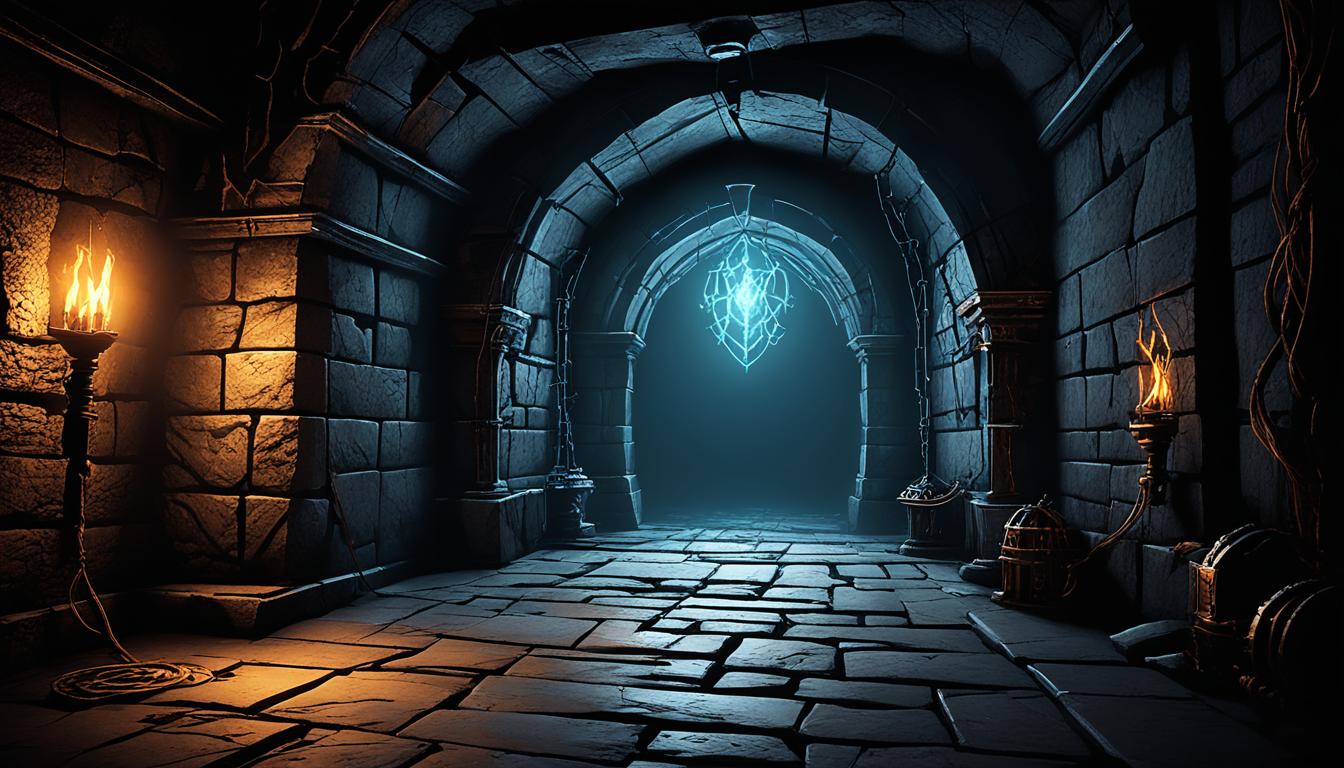Alarm 5e: The Ultimate Guide for D&D 5th Edition Players
Being a devoted Dungeon & Dragons 5th Edition fan, I’ve learned to love the Alarm spell. It’s a crucial part of my game, offering both versatility and essential defense. In this guide, we’ll dive deep into the Alarm spell, exploring how it works, the best ways to use it, and what you should watch out for when using it. No matter your character, whether a wizard, artificer, or something else, mastering the Alarm spell can greatly impact your adventures in the D&D world.

But first, let’s think about something: How can the Alarm spell, a mere 1st-level spell, be such a key defensive tool for skilled D&D 5e players? The insights we’ll discover might just blow your mind. Together, we’ll see just how strategic and adaptable the Alarm spell truly is. So, join me on this journey. Together, we will uncover the power of the Alarm 5e spell to revolutionize your gameplay.
Key Takeaways
- The Alarm spell is a versatile 1st-level abjuration spell that creates a magical ward against unwanted intrusion.
- Alarm can be set to produce either a mental or audible alarm, alerting the caster to potential threats.
- Strategically deploying Alarm spells can help secure entry points and perimeters, integrating with other defensive measures.
- Wizards and artificers can particularly benefit from Alarm’s utility in protecting their living quarters and laboratories.
- Skilled adversaries may employ stealth, illusion, or high-level spells like Dispel Magic to bypass or disrupt Alarm spells.
Understanding the Alarm Spell in D&D 5e
In D&D 5e, the Alarm spell is a powerful 1st-level magic. It lets the caster protect an area from intruders by setting a magical alarm. This spell comes in handy for anyone who wants to keep a space safe, like their home or a lab. Knowing how to use the Alarm spell can make your game more fun and strategic.
What is the Alarm Spell?
The Alarm spell puts a magical barrier around an area, like a door or up to a 20-foot cube. It acts as an early alert, warning you if someone enters without permission. This keeps you and your friends safe from sneak attacks.
Components and Materials Required
To cast this spell, you’ll need a little bell and some silver wire. Both the bell and the wire are used up when you cast the spell. They’re crucial for it to work right.
Range and Area of Effect
The Alarm spell works within 30 feet of you and can cover a 20-foot cube. This lets you keep watch over small but key areas. It’s perfect for guarding a door or a treasure.

Alarm 5e Mechanics
The Alarm spell in D&D 5e lets you pick between a sound or mental alarm. Once cast, you choose if the magic will make a mental sound or sound like a hand bell for 10 seconds within 60 feet.
Mental vs. Audible Alarm
Choose a mental alarm for a quiet warning. It alerts you within 1 mile if you’re sleeping, great for wizards securing their rooms. Or pick an audible alarm to noisily scare off intruders with its sound.
Designated Creatures Exemption
The 5th edition alarm spell lets you pick creatures that won’t trigger the alarm. This means you and your friends can go into the protected area without setting it off. It helps keep a campsite safe or guard an important spot without worry.
Understanding how the alarm ward, alarm glyph, and alarm rune work gives players an advantage. They can set up a smart alarm trap 5e. This makes their alarm ritual a stronger part of their defense in D&D 5e games.
Strategies for Effective Alarm Deployment
To make the most of the Alarm 5e spell in your D&D 5th Edition games, use it smartly. Secure doors, windows, and other ways in with Alarm spells. This creates a magical safety net. It warns you if anyone tries to sneak in.
Securing Entry Points and Perimeters
Place Alarm spells wisely around your area. Especially when camping in risky spots or guarding special places. By covering all points of entry, you get an early heads-up on any potential trouble.
Integrating Alarm with Other Defenses
To boost your security, mix Alarm spells with other precautions like traps. Layer these to make getting in really tough. For instance, match an Alarm spell with a deadly magical trap or a ward. This makes your defense unpredictable for intruders.

Alarm 5e and Character Roles
In D&D 5e, the Alarm spell is a great tool for some characters. Wizards and artificers find it very useful. They set up these magical wards in their labs or living spaces. This keeps their important stuff safe from intruders.
Utility for Wizards and Artificers
Wizards and artificers use the Alarm spell smartly. They place alarm 5e spells at their doorways. This alerts them to anyone entering. They can thus protect their magical items and more. The dnd 5e alarm spell is essential for their privacy and safety.
Alarm in Dungeon Delving
The 5th edition alarm spell helps greatly in dungeons. If the party rests, they set up the arcane alarm. It warns of any magic alarm trap or alarm ward alerts. This keeps them safe and their adventure successful.
Using alarm glyph or alarm rune can make your resting spot safer. It makes a alarm trap 5e against enemies.
Knowing how to use the Alarm spell well improves D&D games. It makes playing more fun for everyone.
Countering and Bypassing Alarm Spells
Alarm 5e is a strong defensive spell. But, it’s not perfect. Enemies who are very skilled can use magic to sneak past the alarm. For example, Pass Without Trace makes someone invisible to the alarm. Illusion spells such as Major Image or Silent Image can also trick the alarm.
Dispel Magic and Counterspell
Advanced spells like Dispel Magic and Counterspell can shut down the Alarm spell. This way, expert spellcasters can get around the alarm. They can then reach their target areas without being noticed.

Conclusion
The Alarm 5e spell is a big help in Dungeon & Dragons 5th Edition. It has many sides, like its mechanics, how you use it, and working with different roles.
It’s key for wizards, artificers, and more. By using Alarm 5e, you can protect key places with alarms or mix it with other defenses.
In D&D 5e, the Alarm spell is a great asset. It helps deal with dungeons, keep your stuff safe, and face big foes. Understand how to use it well and your game will get better.